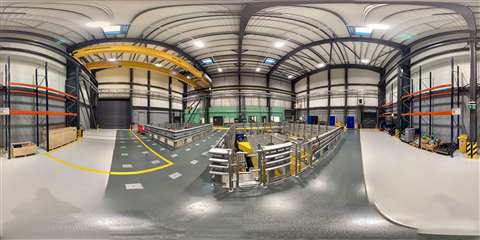New construction lab promises infrastructure shake-up
27 January 2022
€14 million UK facility to examine how structures interact with the ground
A new state-of-the-art facility is set to change the way major infrastructure projects are undertaken, according to its creators.
 A wide-angle view of the SoFSI facility. Picture courtesy Bristol University
A wide-angle view of the SoFSI facility. Picture courtesy Bristol University
The UKCRIC Soil-Foundation-Structure Interaction (SoFSI) facility has been developed by the UK’s University of Bristol, to help make infrastructure design and construction more resilient and cost-effective.
SoFSI will look at the interaction of infrastructure with the ground, specifically when subjected to dynamic loads, be they, for example, weather- or traffic-related.
The laboratory houses a 6m x 5m x 4m deep soil pit, as well as two large shaking tables, one with a 50-tonne capacity, the other a high-performance six-axis table (see the video at the end of the article). The facility will enable researchers to undertake close-to-prototype-scale experiments.
Industry meets academia
Open to both academic researchers and the construction industry, the facility was built with €14.4 million in funding from the Engineering and Physical Sciences Research Council (EPSRC).
As well as promising potential cost savings, experiments undertaken at the laboratory could also lead to reductions in the carbon footprint of high-value infrastructure projects, such as high-speed rail, bridges and offshore wind farms.
The lab has been designed for research into five core areas: nuclear power plant soil-structure interaction, high speed rail, offshore wind turbines, monopiles and pile groups, and integral bridges.
Dr Flavia De Luca, senior lecturer in Structural and Earthquake Engineering at the University of Bristol, said, “We’re investing in state-of-the-art testing facilities that will help cut the cost of building the infrastructure of the future.
“For example, high speed rail will require many new bridges to cross waterways, roads, and other rail lines. SoFSI has been designed to help us understand, among other issues, how the span of lower cost, minimal maintenance integral bridges can be extended so that new high speed railway lines would be faster to construct, cheaper to maintain, more resilient to climate change, and enable us to minimise resource requirements.”
Supporting documents
Click links below to download and view individual files.
STAY CONNECTED



Receive the information you need when you need it through our world-leading magazines, newsletters and daily briefings.
CONNECT WITH THE TEAM








